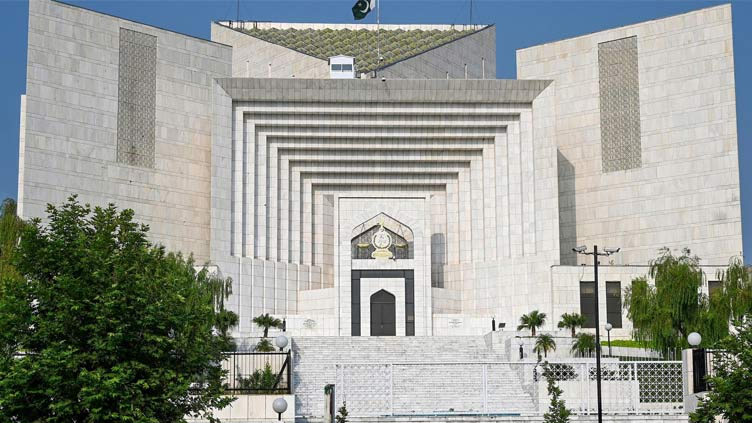SC hints at verdict date in judges' transfer and seniority case

Pakistan
Justice Mazhar stated that if arguments conclude on that date, the bench would issue a short order
ISLMABAD (Dunya News) — The Supreme Court has adjourned the high-profile constitutional case concerning the transfer and seniority of Islamabad High Court judges until June 16, after the counsel for the petitioner judges, Barrister Salahuddin, could not complete his rebuttal arguments.
A five-member constitutional bench, headed by Justice Muhammad Ali Mazhar, heard the case on Thursday.
During the hearing, Barrister Salahuddin argued that constitutional provisions regarding the transfer of judges are clear and that any permanent transfer would render Article 175-A ineffective. He asserted that there is no precedent for a judge being permanently transferred from one high court to another and cited Article 200, which only allows for interim transfers.
Salahuddin emphasised that the power of permanent appointment lies solely with the Judicial Commission, and under Article 175-A, a fresh appointment is required. He differentiated between “appointment” and “transfer,” noting that meaningful consultation is essential for any judge’s transfer, without which the process becomes a mere formality.
He further alleged that in this case, crucial information was withheld and misrepresented. Referring to Section 3 of the Islamabad High Court Act, he pointed out that it mentions appointments but is silent on transfers.
Read Also: SC constitutional bench questions transferred judges' seniority, fresh oath
Justice Muhammad Ali Mazhar remarked that the case before the court involves interpretation of constitutional and legal questions. He noted that the transfer involved the consent of three chief justices and was not entirely in the hands of the executive. He added that the judge’s consent is also obtained in case of transfers, and that a new appointment is possible under Article 175A.
The Attorney General addressed the court, stating that the minutes of the Judicial Commission meeting are available with the court for review. In response, Salahuddin said that he does not possess a “treasure trove” of meeting minutes. Justice Naeem Akhtar Afghan remarked that he would ask some questions about the meeting minutes at the end.
Justice Muhammad Ali Mazhar said this is a first impression case, and the court needs to decide it keeping future implications in mind. Barrister Salahuddin reiterated his earlier position from the first round of hearings, stating that the Judicial Commission did not deliberate on this matter. He asserted that where the law is silent, mandatory provisions cannot be added. He noted that the summary sent to the Prime Minister stated that there would be one judge in Punjab.
Justice Naeem Akhtar Afghan remarked that the power to transfer judges rests with the President, though the transfer process was initiated by the Ministry of Law.
At the conclusion of the hearing, the court postponed further proceedings until June 16. Justice Mazhar stated that if arguments conclude on that date, the bench would issue a short order after consultation.
Barrister Salahuddin requested that the hearing be completed by tomorrow, but Justice Afghan clarified that some bench members would not be available. Salahuddin then suggested resuming the hearing after 1 PM today, but Justice Mazhar declined, saying the rebuttal phase includes questions and could not be concluded today — a view seconded by Justice Salahuddin Panhwar.


